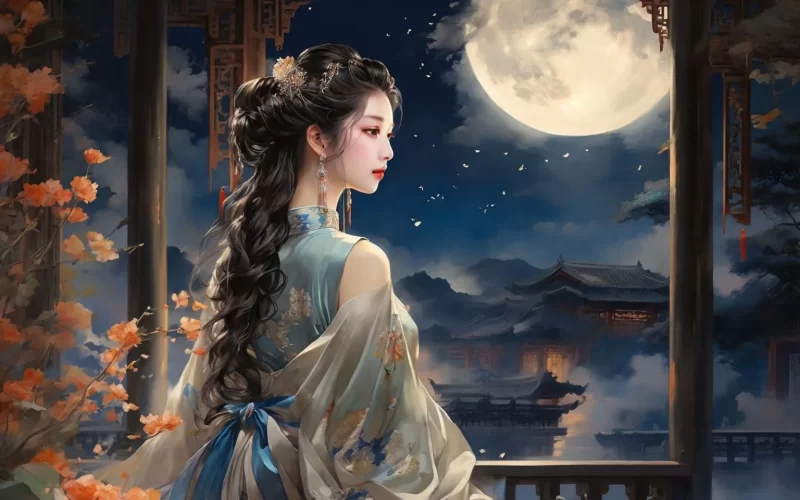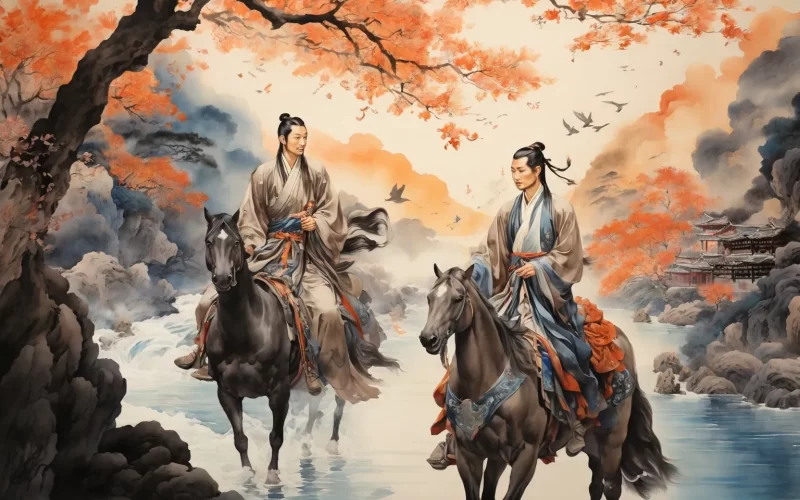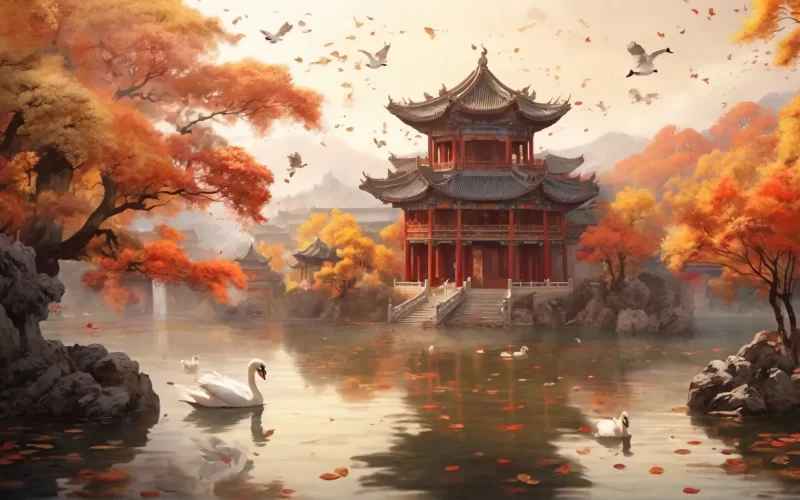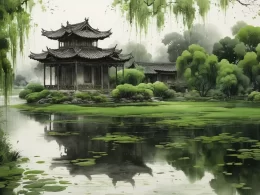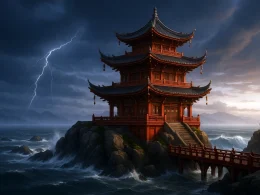High above, from a j ade chamber, songs float half-way to heaven, The palace-girls' gay voices are mingled with the wind - But now they are still, and you hear a water-clock drip in the Court of the Moon... They have opened the curtain wide, they are facing the River of Stars.
Original Poem
「宫词」
顾况
玉楼天半起笙歌,风送宫嫔笑语和。
月殿影开闻夜漏,水晶帘卷近秋河。
Interpretation
This ancient poem is a masterpiece by the Tang Dynasty poet Gu Kuang, depicting the melancholic emotions of a palace woman. Having long served as a literary attendant, Gu Kuang was intimately familiar with the opulence and solitude of court life. Composed likely during his middle or later years, the poem employs a restrained tone and subtle imagery to portray the inner world of a neglected palace maiden lost in contemplation amid luxurious surroundings. It stands as a uniquely innovative work among palace grievance poetry.
Premier distique : « 玉楼天半起笙歌,风送宫嫔笑语和。 »
Yù lóu tiān bàn qǐ shēng gē, fēng sòng gōng pín xiào yǔ hé.
Du pavillon de jade s'élèvent à mi-ciel des chants et musiques, Le vent apporte les rires harmonieux des dames du palais.
Ce couplet peint une scène de fête nocturne à la cour, avec ses "pavillons de jade", ses "musiques" et ses "rires" évoquant tout le faste impérial. Apparente célébration de la joie, cette description prépare en réalité un contraste poignant : derrière cette allégresse, toutes sont-elles vraiment heureuses ? Certaines ne sont-elles pas exclues de ce spectacle ?
Second Couplet: « 月殿影开闻夜漏,水晶帘卷近秋河。 »
Yuè diàn yǐng kāi wén yè lòu, shuǐ jīng lián juǎn jìn qiū hé.
Moonlit halls cast their glow as night water-clock drips, Crystal beads roll up to reveal the autumn Star River.
This couplet shifts from revelry to solitude, where "moonlit halls," "dripping water-clock," and "autumn Star River" weave an atmosphere of hushed desolation. The poet's gaze turns to a solitary figure—a palace maiden who, amidst the silence, counts the water-clock's drops and gazes at the celestial river, her isolation echoing the vastness of the cosmos. Time's passage and fading youth resonate through these images, unspoken yet palpable.
Holistic Appreciation
On the surface, the poem describes the palace's festive atmosphere, but through environmental contrasts and subtle hints, it reveals the emotional state of a forgotten palace maiden. The first couplet portrays a lively banquet, while the second shifts to moonlit halls and drawn curtains, the stark contrast heightening the protagonist's inner solitude. The brilliance lies in the poet's avoidance of explicit sorrow, instead embedding the maiden's quiet lament over fleeting time and life's impermanence within symbolic imagery like "moonlit halls," "dripping water-clock," and "autumn Milky Way." This indirect approach conveys grief without overt expression, showcasing the poet's refined artistry.
Artistic Merits
The poem's greatest artistic feature lies in its use of contrast and subtlety. Gu Kuang juxtaposes "revelry" with "solitude" to highlight the protagonist's inner desolation, while auditory contrasts between "pipes and songs" and "dripping water-clock," as well as visual disparities between "laughter" and "the Milky Way," create a layered emotional progression from external to internal. The language is concise yet elegant, the mood distant and restrained, making it a model among Tang Dynasty palace grievance poetry. Additionally, the phrase "autumn Milky Way" not only marks the season but also alludes to the myth of the Cowherd and Weaver Maid, deepening the sorrow beyond the palace walls to encompass the separation between heaven and earth.
Insights
This poem teaches us that genuine emotional expression need not be explicit; it can instead rely on environment, atmosphere, and symbolism to indirectly reflect the inner world. In life, we too may experience moments of loneliness amid crowds—this "joy for all but sorrow for me" sentiment is among the most delicate yet often overlooked facets of human emotion. Through delicate brushstrokes, the poet captures this feeling with poignant resonance, reminding us to cherish those profound yet unspoken emotional experiences, deep and vast as the sea.
About the poet
Gu Kuang (顾况), 725 - 814 A.D., was a native of Suzhou. He was a skilled painter of landscapes and a good poet, with many poems reflecting reality, caring for the people's illnesses, and having satirical significance.






